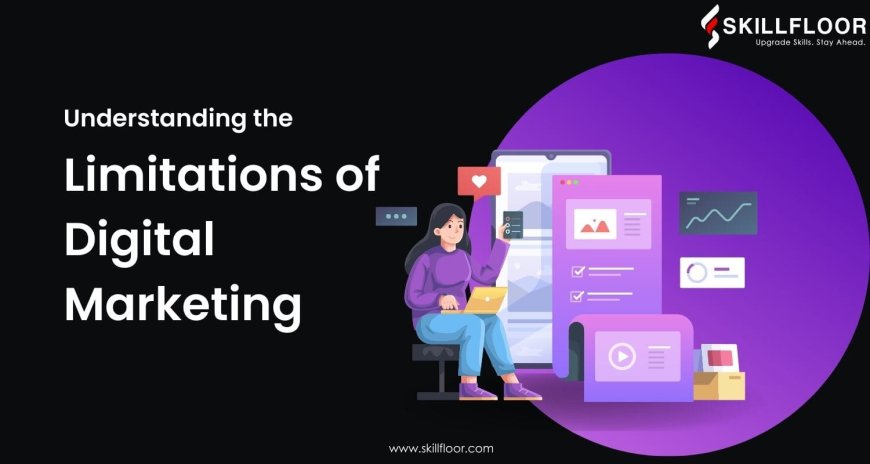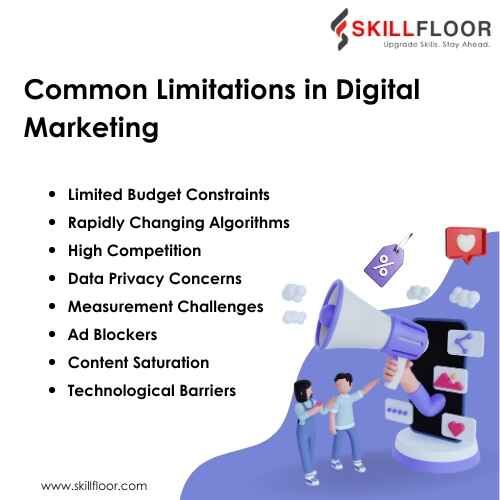Understanding the Limitations of Digital Marketing
Understanding digital marketing challenges: targeting, ROI measurement, and online reputation management. Overcome these effectively.

Businesses strive for online visibility and engagement. Knowing the challenges of digital marketing is crucial. From building a strong Digital Marketing Foundation to managing Search Engine Optimization (SEO) and Certified SEO Expert strategies, each part is important for a company's online presence. However, digital marketing also has its limitations that marketers need to recognize. Digital marketing, including Certified Social Media Marketing Associate and Certified SEO Associate, has changed how brands interact with customers. But its success depends on many factors, from changing algorithms to managing the Certified Brand Reputation Manager's image. These challenges show why it's important to understand digital marketing well.
Dealing with the Limitations of Digital Marketing needs smart strategies. For example, SEO can boost visibility, but the changing search rules mean you must adjust often. Similarly, social media marketing can increase engagement, but limits on organic reach mean paid ads are necessary. Understanding the Limitations of Digital Marketing helps companies use it better. By blending a solid Digital Marketing Foundation with flexible strategies, businesses can reduce risks and increase returns on investment. This introduction shows why knowing and dealing with these challenges can improve digital marketing and keep growth going in a tough digital world.
The Rise of Digital Marketing
Digital marketing has changed the way businesses connect with their audience. As the internet became easier to access, traditional marketing methods started to fade, making room for new online marketing techniques. From SEO (search engine optimization) and SEM (search engine marketing) to content marketing and social media marketing, companies use the Internet to boost their brand visibility and increase sales. Email marketing and PPC (pay-per-click) campaigns help target the right people at the right time.
Despite its benefits, digital marketing has its limitations. The fast-changing nature of online marketing means that what works today might not work tomorrow. Also, the growing competition online makes it hard for smaller businesses to stand out. Recognizing these limitations is key for businesses to keep up and succeed in the world of Internet marketing. By staying updated on the latest trends and constantly improving their strategies, businesses can handle the challenges of digital marketing effectively.

The Challenges Alongside the Benefits of Digital Marketing
Digital marketing has completely changed how businesses connect with their customers, offering many advantages like reaching more people, targeting specific groups, and saving money. But some challenges come with these benefits. One big issue is the Limitations of Digital Marketing. Even though digital marketing has great possibilities, it has its limits too. One major limit is how fast technology changes. Businesses have to keep learning and adapting to new trends and tools. This can be hard for smaller businesses that don't have a lot of money or time.
Another problem is that there's a lot of competition online. Many businesses are all trying to reach the same customers, so standing out takes creative ideas and investing a lot of effort and money. Also, concerns about privacy and software that blocks ads make it harder for digital marketing to work well.
What are the key limitations of Digital Marketing?
1. Saturation of Digital Channels: More businesses are using digital marketing, so it's harder to get noticed on platforms like social media and search engines.
2. Dependency on Technology: Digital marketing depends a lot on technology and algorithms. Changes in algorithms or technology can affect how well strategies work.
3. Ad Blocking: Many people use ad blockers, which can lower how many people see digital ads and make them less effective.
4. Measurement Challenges: Digital marketing gives a lot of data, but it can be hard to understand and measure return on investment (ROI), especially with many touchpoints and ways to attribute sales.
5. Privacy Concerns: Rules about data privacy and worries about keeping data safe can make it harder to collect and use personal information for targeted marketing.
6. Skill and Resource Requirements: Doing digital marketing well needs special skills and resources. This can be hard or expensive for smaller businesses or new startups.
7. Digital Fatigue: People see a lot of digital ads, so they might get tired of them. To keep people interested, businesses need to find new and creative ways to reach them
Addressing Challenges in Digital Marketing
Digital marketing has completely changed how businesses connect with their audiences, but it does come with its own set of challenges. Understanding and addressing these limitations is crucial for creating effective strategies. Here's a practical look at how to handle the constraints of digital marketing:
1. Diverse Audience Engagement: One of the main challenges in digital marketing is making sure you connect well with different groups of people. Different age groups and types of people react differently to marketing efforts, so you need to tailor your strategies accordingly. Methods like creating detailed customer profiles and testing different approaches can help you engage various audience groups effectively.
2. Budget Constraints: Limited budgets often mean that companies can't do as much with their digital marketing. Small and medium-sized businesses, in particular, might find it hard to keep up with larger companies. Using affordable platforms like social media, email marketing, and content creation can help maximize your return on investment while sticking to your budget.
3. Technical Knowledge: Digital marketing requires a good understanding of many tools and platforms, from Search Engine Optimization (SEO) to analyzing data and using automation. Smaller companies and new businesses may not have all the knowledge they need in-house. Working with digital marketing experts or taking online courses, like those available on Skillfloor, can help bridge this gap.
4. Adapting to Changes in Algorithms: Algorithms on social media and search engines are always changing, which can affect how many people see your content. Marketers need to keep up with these changes to keep their digital marketing strategies working well. Regularly checking on things, adapting to changes, and using different marketing methods are all important ways to handle these changes.
5. Keeping Data Safe: People are more aware of how their data is used now, which has led to more rules about this, like GDPR and CCPA. Marketers need to follow these rules carefully while still using personal information to do marketing. Being clear about how you collect data and making sure people agree to it are important ways to build trust with customers.
Handling the challenges of digital marketing means using a smart plan that mixes creativity, and information from data, and keeping up with the rules. By dealing with these issues early, companies can make the most of digital ways to connect with and keep their customers.
Understanding the limitations of digital marketing is important for businesses looking to create effective strategies. Digital marketing has challenges like ad fatigue, privacy concerns, and the need to keep up with changes in algorithms. By recognizing these limitations, companies can better use their resources, improve their approaches, and combine digital marketing with traditional methods for a stronger strategy. Taking a balanced view helps businesses grow steadily and get the most out of their investments in the changing world of digital marketing.



























































